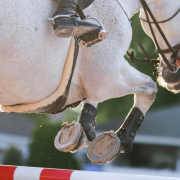Written In Ink: Protecting All Parties

Buying and selling horses is an integral part of the equestrian business industry. From a horse living in someone’s backyard to the purpose-bred imported warmblood, the sale of any horse helps fuel this niche economy. With any financial transaction comes a level of responsibility, and it is beneficial for all parties to be educated and protected while finalizing a sale agreement.
Heels Down spoke with Yvonne Ocrant, a partner at Hinshaw & Culbertson LLP in Chicago, whose spent 15 years practicing equine law, for her perspective on horse sales and the legal protections associated with them.
One of the most common legal issues that arise with horse sales is disagreements over the terms of the sale, be it commission percentages or sales price. So Yvonne says always get it in writing.
“The idea here is how to get all involved parties to be transparent, provide full disclosure, and protect their interests without creating fraud or an improper appearance,” Yvonne explained. “I think when parties get into trouble, it’s because there was a misunderstanding or miscommunication with the terms of the agreement, and if there is no written agreement in place, it becomes more murky.”
Let’s say you ask your riding instructor to help you sell your horse. This is a trainer you’ve worked with for awhile, and you trust them. You set a dollar figure of $10,000. But the trainer sells the horse for $20,000 and pockets the extra $10,000. Is this legal?
“You have to have a strong purchase agreement that clearly outlines any expectations for commissions,” Yvonne advised. “If you agree to give the trainer any amount over the agreed goal, say $10,000, then if it’s put into the agreement there is no confusion. The instances where an agency contract is not entered are where you get into trouble.”
“The more you can put into writing, the better,” Yvonne drills home. “Some states, such as California, Florida, and Kentucky, require certain provisions in a purchase agreement, including commission disclosure. What the legal system is trying to avoid are cases where both the buyer and the seller are paying commissions to the trainer when they think they are the only ones paying that commission.”
The agency contract can be used when a trainer is acting on behalf of one or both buying and selling parties. “Fiduciary duty” becomes a term that anyone who plans to utilize the services of a trainer to help sell or find them a horse should familiarize themselves with. A fiduciary is a person who holds a legal or ethical relationship of trust with one or more other parties.
“Fiduciary duty raises more legal questions,” Yvonne said. “The trainer also needs to act in their best interest, and here is where having an agency agreement will protect both parties and help keep the communication clear in the event of a misunderstanding.”
Surprisingly, Yvonne says that many cases she has seen throughout her career involve a lack of written contracts, and this is something she’s trying to change.
“I think the disconnect comes from two directions,” she said. “One, they don’t want to spend money on a lawyer and a contract. Two, they don’t think the contract will be enforceable. And third, which is perhaps the most disappointing as a legal professional, is that they think involving a lawyer will complicate matters, when in reality the purpose is to simplify and protect. I work odd hours and weekends so that I can have a contract ready for my clients on short notice. Money moves a lot faster now, and so it’s easy to get rushed because the horse may sell to someone else.”


